|
|
|
Sort Order |
|
|
|
Items / Page
|
|
|
|
|
|
|
| Srl | Item |
| 1 |
ID:
044930
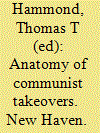

|
|
|
|
|
| Publication |
New Haven, Yale University Press, 1975.
|
| Description |
xvii, 664p.
|
| Standard Number |
0300017995
|
|
|
|
|
|
|
|
|
|
|
|
Copies: C:1/I:0,R:0,Q:0
Circulation
| Accession# | Call# | Current Location | Status | Policy | Location |
| 014980 | 320.532/HAM 014980 | Main | On Shelf | General | |
|
|
|
|
| 2 |
ID:
095091
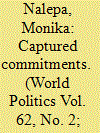

|
|
|
|
|
| Publication |
2010.
|
| Summary/Abstract |
How can outgoing autocrats enforce promises of amnesty once they have left power? Why would incoming opposition parties honor their prior promises of amnesty once they have assumed power and face no independent mechanisms of enforcement? In 1989 autocrats in a number of communist countries offered their respective oppositions free elections in exchange for promises of amnesty. The communists' decision appears irrational given the lack of institutions to enforce these promises of amnesty. What is further puzzling is that the former opposition parties that won elections in many countries actually refrained from implementing transitional justice measures. Their decision to honoring their prior agreements to grant amnesty seems as irrational as the autocrats' decisions to place themselves at the mercy of their opponents. Using an analytic narrative approach, the author explains this paradox by modeling pacted transitions not as simple commitment problems but as games of incomplete information where the uninformed party has "skeletons in its closet"-that is,embarrassing information that provides insurance against the commitments being broken. The author identifies the conditions under which autocrats step down even though they can be punished with transitional justice and illustrates the results with case studies from Czechoslovakia, Poland, and Hungary.
|
|
|
|
|
|
|
|
|
|
|
|
|
|
|
|
| 3 |
ID:
038868
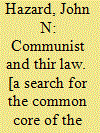

|
|
|
|
|
| Publication |
Chicago, University of Chicago Press, 1969.
|
| Description |
xiv, 541p.
|
|
|
|
|
|
|
|
|
|
|
|
Copies: C:1/I:0,R:0,Q:0
Circulation
| Accession# | Call# | Current Location | Status | Policy | Location |
| 004100 | 321.92/HAZ 004100 | Main | On Shelf | General | |
|
|
|
|
| 4 |
ID:
045334
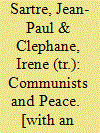

|
|
|
|
|
| Publication |
London, Hamish Hamilton, 1969.
|
| Description |
296p.
|
|
|
|
|
|
|
|
|
|
|
|
Copies: C:1/I:0,R:0,Q:0
Circulation
| Accession# | Call# | Current Location | Status | Policy | Location |
| 002457 | 327.172/SAR 002457 | Main | On Shelf | General | |
|
|
|
|
| 5 |
ID:
146799
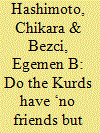

|
|
|
|
|
| Summary/Abstract |
A Kurdish proverb says that the Kurds have ‘no friends but the mountains’. This was not what the Turkish authorities believed. Using new and previously unexploited archives both in English and Turkish, this article offers a new interpretation of Turkey's perception of the Kurds. By analyzing Kurdish activities and their alignment with Communist movements and Soviet activities, it shows how Turkey's threat perception was shaped by international contexts, especially through the Cold War. In addition, the Kurdish nationalist movement in the Middle East played a pivotal role in regional intelligence cooperation between Turkey, Iraq and Iran. This article argues that Soviet and Communist activities had an important role in shaping Turkey's threat perception of the Kurdish minority in the country. Turkey's perception of subversive threats involved an intertwining of Communists, Soviets and Kurds. This affected the Kurdish bid for independence for most of the twentieth century.
|
|
|
|
|
|
|
|
|
|
|
|
|
|
|
|
| 6 |
ID:
180050
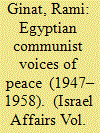

|
|
|
|
|
| Summary/Abstract |
This article sets out to closely scrutinise the main phases of the campaign for peace (1947–58) undertaken by left-wing Egyptian groups. Based on exclusive first-hand Egyptian communist primary sources – archival and others, it shows that although the communists were the only Egyptian political groups to support the November 1947 UN partition resolution on Palestine, President Gamal Abdel Nasser later, during the Bandung Conference (1955), followed suit yet no concrete official actions were taken by neither the Egyptian nor the Israeli political elites before the 1956 Suez War. Following that war, the prospects for an Egyptian–Israeli peace settlement were shut off for nearly two decades.
|
|
|
|
|
|
|
|
|
|
|
|
|
|
|
|
| 7 |
ID:
167681
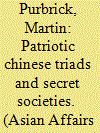

|
|
|
|
|
| Summary/Abstract |
Triad and other secret societies have been mutual aid groups, personal networks amongst Chinese, organised criminal gangs, as well as associated with patriotism. The perceived patriotism of triads originated in the support of some for the restoration of the Ming Dynasty and overthrow of the Manchu Qing dynasty. The association of triads with patriotism continued as triad and secret societies used regimes for advantage and regimes likewise used them when in need of support. The Nationalists (Kuomintang), the Communists, and even the British have worked with or used triad or other secret societies when the need has arisen. The pretext of patriotism is a central factor in the durability of triad and secret societies in China. This article seeks to explain the frequent association of triad societies with patriotism and why this has contributed to the durability of the criminality of triads that overlooks their long-term criminality.
|
|
|
|
|
|
|
|
|
|
|
|
|
|
|
|
| 8 |
ID:
132153
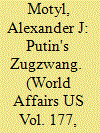

|
|
|
|
|
| Publication |
2014.
|
| Summary/Abstract |
The choice of outcome in the Russia-Ukraine standoff is largely Vladimir Putin's. Ukraine and the West are not powerless, but they can at most anticipate, prepare for, and deter what might be Putin's next move. This does not mean that they are victims of superior statecraft, however. His admirers may regard Putin as a master strategist, whose petulance and unpredictability give him the upper hand in relations with the West and Ukraine. In fact, the opposite is true. Putin has maneuvered himself, and Russia, into a position of Zugzwang-a chess term denoting a condition in which any possible move will worsen the player's position.*
|
|
|
|
|
|
|
|
|
|
|
|
|
|
|
|
|
|
|
|
|